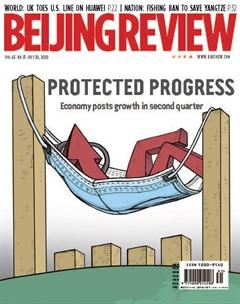Lenders Find New Ways to Support Epidemic-Hit Businesses
Sensheng, a plastics manufacturer based in Taizhou, Zhejiang Province in east China, was on the verge of letting go around 20 percent of its staff to pay back a 3-million-yuan($429,418) loan that was about to be overdue, when its lender, Taizhou Bank, came to its rescue.
Under the banks new policy designed to cushion epidemic impact, the fi rm was able to renew the loan without having to pay back the 3-million-yuan principal, as long as it promised to spend the funds on business operation and keep its employees on the payroll.
Sensheng is one of many Chinese companies craving for funds to keep their businesses going after the epidemic dampened demand and slowed production. A central bank survey showed that credit demand in over 300 cities across China has climbed up, resulting in more loans drawn by early July than the same period last year.
The financial system has to think outside the box to fi gure out who needs help and, given the epidemic-induced hardship for companies, what could be done to help them access lifesaving funds.
Banks have taken measures to locate the companies that might need help.
Branches of the Peoples Bank of China(PBC) in Chongqing Municipality, Jilin and Hebei provinces have launched big data systems that serve as handy liaisons between banks and companies.
Jilin in northeast China, for example, uses an online platform that can profile small and micro fi rms based on public information from local authorities. With the help of big data technologies, the platform attaches a companys credit information to its loan application submitted to banks, which will help shorten the time for approval.
By mid-June, the platform, whose users include 126 banks and 5,842 registered companies in Jilin, had seen 747 loans issued, amounting to nearly 1.83 billion yuan ($262.4 million).
“The platform will help nurture the growth of small and micro fi rms in Jilin,” Liang Deshun, President of China Construction Banks Jilin branch, said.
Jiangsu Province in east China went one step further. The PBCs Taizhou branch crossreferenced forex data for goods trade and corporate credit data to compile a list of 4,000 local trade firms and advised banks to inquire about their fi nancial needs.
To the delight of many cash-starved local companies, such inquiries are also made by banks in neighboring Zhejiang Province. Wu Lijun, who runs a tech fi rm in Zhejiangs capital Hangzhou, said his company received a 1-million-yuan ($143,394) loan one day after Bank of Hangzhou called him to learn about his liquidity situation.
Efforts to facilitate access to loans resulted in more corporate loans being approved by early July than the combined total of the first three quarters of last year, and 72.6 percent of new loans in the first half of this year went to companies and public institutions.
Even when their fi nancial needs are known, some companies, especially small and micro ones, fear that their applications might be rejected for reasons like insufficient assets as collateral.
The PBCs office in Chongqing, southwest China, has recently worked with local lenders to allow hogs to be used as collateral for loans, shedding light on the extra mile the country is willing to go to ensure that credit support truly reaches the eligible fi rms.
Lenders normally would not accept live- stock such as hogs as collateral because it is hard to determine if the applicant actually owns the hogs and how much they are worth. Besides, lenders face the risk of losing the hogs to diseases.
In Chongqing, where hog breeding is a major industry, the collateral conundrum is solved with the use of a big data platform to track and report to banks information on the output, health conditions and prices of hogs, which helps banks determine the size of the loans based on the sum insured for the companiesbreeding sows.
Under the policy, two hog breeders in Chongqing saw the size of their loans more than quadruple, and are expected to help lift local households out of poverty.
Another alternative to fixed assets for collateral is tax records. Chinas tax and banking regulators pledged in an April circular to help small and micro firms access loans using eligible tax payment ratings, and lenders like China Construction Bank have unveiled credit products that can enable the practice.
Credit loans without collateral or third-party guarantees are increasingly common for small and micro firms, with their share in all loans issued to small and micro fi rms up 2.8 percentage points by the end of May from the end of last year, offi cial data showed.
The popularity of credit loans signals that Chinas financial system is lending more concrete support to the real economy, which is the overarching goal behind efforts to facilitate access to loans.
To that end, the country has devised monetary policy instruments to help small and micro enterprises maintain cash fl ow, and called on fi nancial institutions to pass 1.5 trillion yuan ($215 billion) worth of their profi ts to companies.
“In the fi rst half of this year, Chinas fi nancial system has effi ciently served the real economy as well as effectively supported COVID-19 control and economic growth,” Ruan Jianhong, an offi cial with the PBC, said.

